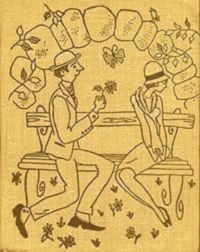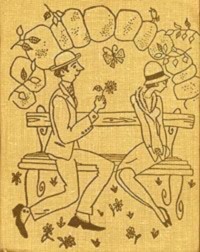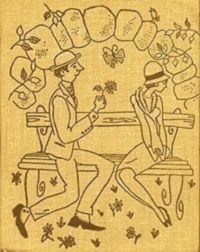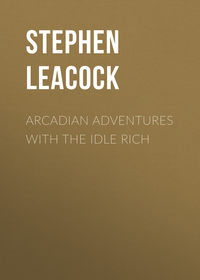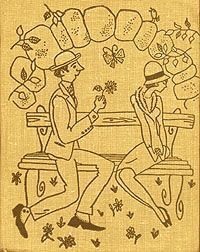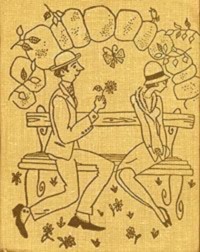 полная версия
полная версияWinsome Winnie and other New Nonsense Novels
"No, of course not," said the other speaker. "But I suppose you can throw the bricks out on the lawn."
"Yes," said Fortescue, "and sit on them to eat lunch. We had a big fight in the legislature over that, but we got it through."
"Thank you, but I feel I am interrupting."
"Well, I was only saying that, as soon as I had made up my mind that the trouble was in the cellar, the whole case was simple. I took my colleagues down at once, and we sat on the floor of the cellar and held a consultation till the overpowering smell of gas convinced me that there was nothing for it but an operation on the floor. The whole thing was most successful. I was very glad, as it happened that the proprietor of the house was a very decent fellow, employed, I think, as a manager of a bank, or something of the sort. He was most grateful. It was he who gave me the engraved monkey wrench that some of you were admiring before dinner. After we had finished the whole operation—I forgot to say that we had thrown the coal out on the lawn to avoid any complication—he quite broke down. He offered us to take his whole house and keep it."
"You don't do that, do you?" asked the outsider.
"Oh no, never," said Fortescue. "We've made a very strict professional rule against it. We found that some of the younger men were apt to take a house when they were given it, and we had to frown down on it. But, gentlemen, I feel that when Mr. Thornton says that he never goes down into a cellar there must be a story behind it. I think we should invite him to relate it to us."
A murmur of assent greeted the speaker's suggestion. For myself I was particularly pleased, inasmuch as I have long felt that Thornton as a raconteur was almost as interesting as in the rôle of an operating plumber. I have often told him that, if he had not happened to meet success in his chosen profession, he could have earned a living as a day writer: a suggestion which he has always taken in good part and without offence.
Those of my readers who have looked through the little volume of Reminiscences which I have put together, will recall the narrative of The Missing Nut and the little tale entitled The Blue Blow Torch as instances in point.
"Not much of a story, perhaps," said Thornton, "but such as it is you are welcome to it. So, if you will just fill up your glasses with raspberry vinegar, you may have the tale for what it is worth."
We gladly complied with the suggestion and Thornton continued:
"It happened a good many years ago at a time when I was only a young fellow fresh from college, very proud of my Plumb. B., and inclined to think that I knew it all. I had done a little monograph on Choked Feed in the Blow Torch, which had attracted attention, and I suppose that altogether I was about as conceited a young puppy as one would find in the profession. I should mention that at this time I was not married, but had set up a modest apartment of my own with a consulting-room and a single manservant. Naturally I could not afford the services of a solderist or a gassist and did everything for myself, though Simmons, my man, could at a pinch be utilized to tear down plaster and break furniture."
Thornton paused to take a sip of raspberry vinegar and went on:
"Well, then. I had come home to dinner particularly tired after a long day. I had sat in an attic the greater part of the afternoon (a case of top story valvular trouble) and had had to sit in a cramped position which practically forbade sleep. I was feeling, therefore, none too well pleased, when a little while after dinner the bell rang and Simmons brought word to the library that there was a client in the consulting-room. I reminded the fellow that I could not possibly consider a case at such an advanced hour unless I were paid emergency overtime wages with time and a half during the day of recovery."
"One moment," interrupted the outside member. "You don't mention compensation for mental shock. Do you not draw that here?"
"We do now" explained Thornton, "but the time of which I speak is some years ago and we still got nothing for mental shock, nor disturbance of equilibrium. Nowadays, of course, one would insist on a substantial retainer in advance.
"Well, to continue. Simmons, to my surprise, told me that he had already informed the client of this fact, and that the answer had only been a plea that the case was too urgent to admit of delay. He also supplied the further information that the client was a young lady. I am afraid," added Thornton, looking round his audience with a sympathetic smile, "that Simmons (I had got him from Harvard and he had not yet quite learned his place) even said something about her being strikingly handsome."
A general laugh greeted Thornton's announcement.
"After all," said Fortescue, "I never could see why an Ice Man should be supposed to have a monopoly on gallantry."
"Oh, I don't know," said Thornton. "For my part—I say it without affectation—the moment I am called in professionally, women, as women, cease to exist for me. I can stand beside them in the kitchen and explain to them the feed tap of a kitchen range without feeling them to be anything other than simply clients. And for the most part, I think, they reciprocate that attention. There are women, of course, who will call a man in with motives—but that's another story. I must get back to what I was saying.
"On entering the consulting-room I saw at once that Simmons had exaggerated nothing in describing my young client as beautiful. I have seldom, even among our own class, seen a more strikingly handsome girl. She was dressed in a very plain and simple fashion which showed me at once that she belonged merely to the capitalist class. I am, as I think you know, something of an observer, and my eye at once noted the absence of heavy gold ear-rings and wrist-bangles. The blue feathers at the side of her hat were none of them more than six inches long, and the buttons on her jacket were so inconspicuous that one would hardly notice them. In short, while her dress was no doubt good and serviceable, there was an absence of chic, a lack of noise about it, that told at once the tale of narrow circumstances.
"She was evidently in great distress.
"'Oh, Mr. Thornton,' she exclaimed, advancing towards me, 'do come to our house at once. I simply don't know what to do.'
"She spoke with great emotion, and seemed almost on the point of breaking into tears.
"'Pray, calm yourself, my dear young lady,' I said, 'and try to tell me what is the trouble.'
"'Oh, don't lose any time,' she said, 'do, do come at once.'
"'We will lose no time' I said reassuringly, as I looked at my watch. 'It is now seven-thirty. We will reckon the time from now, with overtime at time and a half. But if I am to do anything for you I must have some idea of what has happened.'
"'The cellar boiler,' she moaned, clasping her hands together, 'the cellar boiler won't work!'
"'Ah!' I said soothingly. 'The cellar boiler won't work. Now tell me, is the feed choked, miss?'
"'I don't know,' she exclaimed.
"'Have you tried letting off the exhaust?'
"She shook her head with a doleful look.
"'I don't know what it is,' she said.
"But already I was hastily gathering together a few instruments, questioning her rapidly as I did so.
"'How's your pressure gauge?' I asked. 'How's your water? Do you draw from the mains or are you on the high level reservoir?'
"It had occurred to me at once that it might be merely a case of stoppage of her main feed, complicated, perhaps, with a valvular trouble in her exhaust. On the other hand it was clear enough that, if her feed was full and her gauges working, her trouble was more likely a leak somewhere in her piping.
"But all attempts to draw from the girl any clear idea of the symptoms were unavailing. All she could tell me was that the cellar boiler wouldn't work. Beyond that her answers were mere confusion. I gathered enough, however, to feel sure that her main feed was still working, and that her top story check valve was probably in order. With that I had to be content.
"As a young practitioner, I had as yet no motor car. Simmons, however, summoned me a taxi, into which I hurriedly placed the girl and my basket of instruments, and was soon speeding in the direction she indicated. It was a dark, lowering night, with flecks of rain against the windows of the cab, and there was something in the lateness of the hour (it was now after half-past eight) and the nature of my mission which gave me a stimulating sense of adventure. The girl directed me, as I felt sure she would, towards the capitalist quarter of the town. We had soon sped away from the brightly lighted streets and tall apartment buildings among which my usual practice lay, and entered the gloomy and dilapidated section of the city where the unhappy capitalist class reside. I need not remind those of you who know it that it is scarcely a cheerful place to find oneself in after nightfall. The thick growth of trees, the silent gloom of the ill-lighted houses, and the rank undergrowth of shrubs give it an air of desolation, not to say danger. It is certainly not the place that a professional man would choose to be abroad in after dark. The inhabitants, living, so it is said, on their scanty dividends and on such parts of their income as our taxation is still unable to reach, are not people that one would care to fall in with after nightfall.
"Since the time of which I speak we have done much to introduce a better state of things. The opening of day schools of carpentry, plumbing and calcimining for the children of the capitalist is already producing results. Strange though it may seem, one of the most brilliant of our boiler fitters of to-day was brought up haphazard in this very quarter of the town and educated only by a French governess and a university tutor. But at the time practically nothing had been done. The place was infested with consumers, and there were still, so it was said, servants living in some of the older houses. A butler had been caught one night in a thick shrubbery beside one of the gloomy streets.
"We alighted at one of the most sombre of the houses, and our taxi-driver, with evident relief, made off in the darkness.
"The girl admitted us into a dark hall, where she turned on an electric light. 'We have light,' she said, with that peculiar touch of pride that one sees so often in her class, 'we have four bulbs.'
"Then she called down a flight of stairs that apparently led to the cellar:
"'Father, the plumber has come. Do come up now, dear, and rest.'
"A step sounded on the stairs, and there appeared beside us one of the most forbidding-looking men that I have ever beheld. I don't know whether any of you have ever seen an Anglican Bishop. Probably not. Outside of the bush, they are now never seen. But at the time of which I speak there were a few still here and there in the purlieus of the city. The man before us was tall and ferocious, and his native ferocity was further enhanced by the heavy black beard which he wore in open defiance of the compulsory shaving laws. His black shovel-shaped hat and his black clothes lent him a singularly sinister appearance, while his legs were bound in tight gaiters, as if ready for an instant spring. He carried in his hand an enormous monkey wrench, on which his fingers were clasped in a restless grip.
"'Can you fix the accursed thing?' he asked.
"I was not accustomed to being spoken to in this way, but I was willing for the girl's sake to strain professional courtesy to the limit.
"'I don't know,' I answered, 'but if you will have the goodness first to fetch me a little light supper, I shall be glad to see what I can do afterwards.'
"My firm manner had its effect. With obvious reluctance the fellow served me some biscuits and some not bad champagne in the dining-room.
"The girl had meantime disappeared upstairs.
"'If you're ready now,' said the Bishop, 'come on down.'
"We went down to the cellar. It was a huge, gloomy place, with a cement floor, lighted by a dim electric bulb. I could see in the corner the outline of a large furnace (in those days the poorer classes had still no central heat) and near it a tall boiler. In front of this a man was kneeling, evidently trying to unscrew a nut, but twisting it the wrong way. He was an elderly man with a grey moustache, and was dressed, in open defiance of the law, in a military costume or uniform.
"He turned round towards us and rose from his knees.
"'I'm dashed if I can make the rotten thing go round,' he said.
"'It's all right, General,' said the Bishop. 'I have brought a plumber.'
"For the next few minutes my professional interest absorbed all my faculties. I laid out my instruments upon a board, tapped the boiler with a small hammer, tested the feed-tube, and in a few moments had made what I was convinced was a correct diagnosis of the trouble.
"But here I encountered the greatest professional dilemma in which I have ever been placed. There was nothing wrong with the boiler at all. It connected, as I ascertained at once by a thermo-dynamic valvular test, with the furnace (in fact, I could see it did), and the furnace quite evidently had been allowed to go out.
"What was I to do? If I told them this, I broke every professional rule of our union. If the thing became known I should probably be disbarred and lose my overalls for it. It was my plain professional duty to take a large hammer and knock holes in the boiler with it, smash up the furnace pipes, start a leak of gas, and then call in three or more of my colleagues.
"But somehow I couldn't find it in my heart to do it. The thought of the girl's appealing face arose before me.
"'How long has this trouble been going on?' I asked sternly.
"'Quite a time,' answered the Bishop. 'It began, did it not, General, the same day that the confounded furnace went out? The General here and Admiral Hay and I have been working at it for three days.'
"'Well, gentlemen,' I said, 'I don't want to read you a lesson on your own ineptitude, and I don't suppose you would understand it if I did. But don't you see that the whole trouble is because you let the furnace out? The boiler itself is all right, but you see, gents, it feeds off the furnace.'
"'Ah,' said the Bishop in a deep melodious tone, 'it feeds off the furnace. Now that is most interesting. Let me repeat that; I must try to remember it; it feeds off the furnace. Just so.'
"The upshot was that in twenty minutes we had the whole thing put to rights. I set the General breaking up boxes and had the Bishop rake out the clinkers, and very soon we had the furnace going and the boiler in operation.
"'But now tell me,' said the Bishop, 'suppose one wanted to let the furnace out—suppose, I mean to say, that it was summer-time, and suppose one rather felt that one didn't care about a furnace and yet one wanted one's boiler going for one's hot water, and that sort of thing, what would one do?'
"'In that case,' I said, 'you couldn't run your heating off your furnace: you'd have to connect in your tubing with a gas generator.'
"'Ah, there you get me rather beyond my depth,' said the Bishop.
"The General shook his head. 'Bishop,' he said, 'just step upstairs a minute; I have an idea.'
"They went up together, leaving me below. To my surprise and consternation, as they reached the top of the cellar stairs, I saw the General swing the door shut and heard a key turn in the lock. I rushed to the top of the stairs and tried in vain to open the door. I was trapped. In a moment I realized my folly in trusting myself in the hands of these people.
"I could hear their voices in the hall, apparently in eager discussion.
"'But the fellow is priceless,' the General was saying. 'We could take him round to all the different houses and make him fix them all. Hang it, Bishop, I haven't had a decent tap running for two years, and Admiral Hay's pantry has been flooded since last March.'
"'But one couldn't compel him?'
"'Certainly, why not? I'd compel him bally quick with this.'
"I couldn't see what the General referred to, but had no doubt that it was the huge wrench that he still carried in his hand.
"'We could gag the fellow,' he went on, 'take him from house to house and make him put everything right.'
"'Ah, but afterwards?' said the Bishop.
"'Afterwards,' answered the General, 'why kill him! Knock him on the head and bury him under the cement in the cellar. Hay and I could easily bury him, or for that matter I imagine one could easily use the furnace itself to dispose of him.'
"I must confess that my blood ran cold as I listened.
"'But do you think it right?' objected the Bishop. 'You will say, of course, that it is only killing a plumber; but yet one asks oneself whether it wouldn't be just a leetle bit unjustifiable.'
"'Nonsense,' said the General. 'You remember that last year, when Hay strangled the income tax collector, you yourself were very keen on it.'
"'Ah, that was different,' said the Bishop, 'one felt there that there was an end to serve, but here–'
"'Nonsense,' repeated the General, 'come along and get Hay. He'll make short work of him.'
"I heard their retreating footsteps and then all was still.
"The horror which filled my mind as I sat in the half darkness waiting for their return I cannot describe. My fate appeared sealed and I gave myself up for lost, when presently I heard a light step in the hall and the key turned in the lock.
"The girl stood in front of me. She was trembling with emotion.
"'Quick, quick, Mr. Thornton,' she said. 'I heard all that they said. Oh, I think it's dreadful of them, simply dreadful. Mr. Thornton, I'm really ashamed that Father should act that way.'
"I came out into the hall still half dazed.
"'They've gone over to Admiral Hay's house, there among the trees. That's their lantern. Please, please, don't lose a minute. Do you mind not having a cab? I think really you'd prefer not to wait. And look, won't you please take this?'—she handed me a little packet as she spoke—'this is a piece of pie: you always get that, don't you? and there's a bit of cheese with it, but please run.'
"In another moment I had bounded from the door into the darkness. A wild rush through the darkened streets, and in twenty minutes I was safe back again in my own consulting-room."
Thornton paused in his narrative, and at that moment one of the stewards of the club came and whispered something in his ear.
He rose.
"I'm sorry," he said, with a grave face. "I'm called away; a very old client of mine. Valvular trouble of the worst kind. I doubt if I can do anything, but I must at least go. Please don't let me break up your evening, however."
With a courtly bow he left us.
"And do you know the sequel to Thornton's story?" asked Fortescue with a smile.
We looked expectantly at him.
"Why, he married the girl," explained Fortescue. "You see, he had to go back to her house for his wrench. One always does."
"Of course," we exclaimed.
"In fact he went three times; and the last time he asked the girl to marry him and she said 'yes.' He took her out of her surroundings[**missing comma?] had her educated at a cooking school, and had her given lessons on the parlour organ. She's Mrs. Thornton now."
"And the Bishop?" asked some one.
"Oh, Thornton looked after him. He got him a position heating furnaces in the synagogues. He worked at it till he died a few years ago. They say that once he got the trick of it he took the greatest delight in it. Well, I must go too. Good night."
VII
THE BLUE AND THE GREY A PRE-WAR WAR STORY
CHAPTER I
The scene was a striking one. It was night. Never had the Mississippi presented a more remarkable appearance. Broad bayous, swollen beyond our powers of description, swirled to and fro in the darkness under trees garlanded with Spanish moss. All moss other than Spanish had been swept away by the angry flood of the river.
Eggleston Lee Carey Randolph, a young Virginian, captain of the –th company of the –th regiment of –'s brigade—even this is more than we ought to say, and is hard to pronounce—attached to the Army of the Tennessee, struggled in vain with the swollen waters. At times he sank. At other times he went up.
In the intervals he wondered whether it would ever be possible for him to rejoin the particular platoon of the particular regiment to which he belonged, and of which's whereabouts (not having the volume of the army record at hand) he was in ignorance. In the intervals, also, he reflected on his past life to a sufficient extent to give the reader a more or less workable idea as to who and to what he was. His father, the old grey-haired Virginian aristocrat, he could see him still. "Take this sword, Eggleston," he had said, "use it for the State; never for anything else: don't cut string with it or open tin cans. Never sheathe it till the soil of Virginia is free. Keep it bright, my boy: oil it every now and then, and you'll find it an A 1 sword."
Did Eggleston think, too, in his dire peril of another—younger than his father and fairer? Necessarily, he did. "Go, Eggleston!" she had exclaimed, as they said farewell under the portico of his father's house where she was visiting, "it is your duty. But mine lies elsewhere. I cannot forget that I am a Northern girl. I must return at once to my people in Pennsylvania. Oh, Egg, when will this cruel war end?"
So had the lovers parted.
Meanwhile—while Eggleston is going up and down for the third time, which is of course the last—suppose we leave him, and turn to consider the general position of the Confederacy. All right: suppose we do.
CHAPTER II
At this date the Confederate Army of the Tennessee was extended in a line with its right resting on the Tennessee and its left resting on the Mississippi. Its rear rested on the rugged stone hills of the Chickasaba range, while its front rested on the marshes and bayous of the Yazoo. Having thus—as far as we understand military matters—both its flanks covered and its rear protected, its position was one which we ourselves consider very comfortable.
It was thus in an admirable situation for holding a review or for discussing the Constitution of the United States in reference to the right of secession.
The following generals rode up and down in front of the army, namely, Mr. A. P. Hill, Mr. Longstreet, and Mr. Joseph Johnston. All these three celebrated men are thus presented to our readers at one and the same time without extra charge.
But who is this tall, commanding figure who rides beside them, his head bent as if listening to what they are saying (he really isn't) while his eye alternately flashes with animation or softens to its natural melancholy? (In fact, we can only compare it to an electric light bulb with the power gone wrong.) Who is it? It is Jefferson C. Davis, President, as our readers will be gratified to learn, of the Confederate States.
It being a fine day and altogether suitable for the purpose, General Longstreet reined in his prancing black charger (during this distressed period all the horses in both armies were charged: there was no other way to pay for them), and in a few terse words, about three pages, gave his views on the Constitution of the United States.
Jefferson Davis, standing up in his stirrups, delivered a stirring harangue, about six columns, on the powers of the Supreme Court, admirably calculated to rouse the soldiers to frenzy. After which General A. P. Hill offered a short address, soldier-like and to the point, on the fundamental principles of international law, which inflamed the army to the highest pitch.
At this moment an officer approached the President, saluted and stood rigidly at attention. Davis, with that nice punctilio which marked the Southern army, returned the salute.
"Do you speak first?" he said, "or did I?"
"Let me," said the officer. "Your Excellency," he continued, "a young Virginian officer has just been fished out of the Mississippi."
Davis's eye flashed. "Good!" he said. "Look and see if there are many more," and then he added with a touch of melancholy, "The South needs them: fish them all out. Bring this one here."



